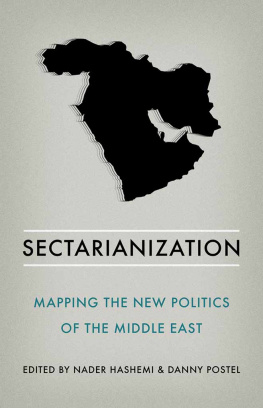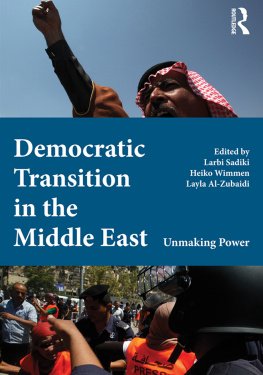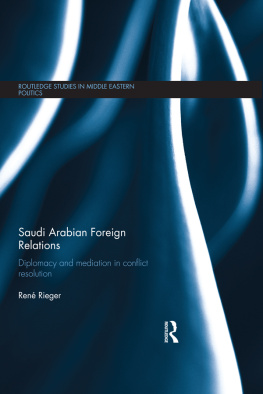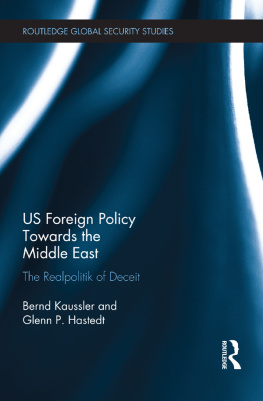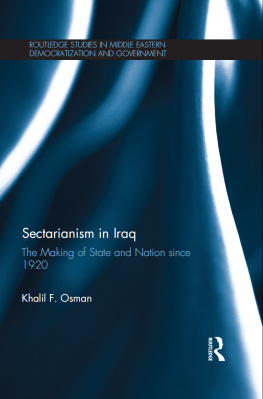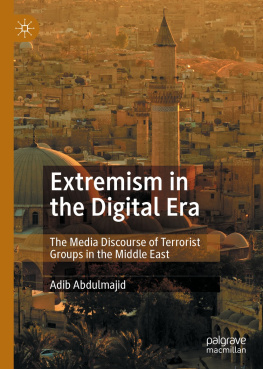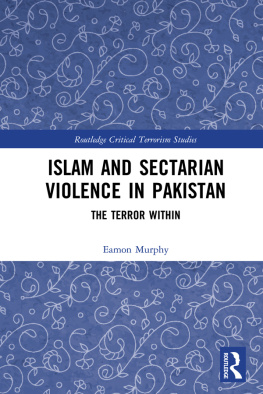SECTARIANIZATION
NADER HASHEMI
DANNY POSTEL
(Editors)
Sectarianization
Mapping the New Politics
of the Middle East


Oxford University Press is a department of the University of Oxford. It furthers the Universitys objective of excellence in research, scholarship, and education by publishing worldwide.
OxfordNew York
AucklandCape TownDar es SalaamHong KongKarachi
Kuala LumpurMadridMelbourneMexico CityNairobiNew DelhiShanghaiTaipeiToronto
With offices in
ArgentinaAustriaBrazilChileCzech RepublicFranceGreeceGuatemalaHungaryItalyJapanPolandPortugalSingaporeSouth KoreaSwitzerlandThailandTurkeyUkraineVietnam
Oxford is a registered trade mark of Oxford University Press in the UK and certain other countries.
Published in the United States of America by
Oxford University Press
198 Madison Avenue, New York, NY 10016
Copyright Nader Hashemi and Danny Postel 2017
All rights reserved. No part of this publication may be reproduced, stored in a retrieval system, or transmitted, in any form or by any means, without the prior permission in writing of Oxford University Press, or as expressly permitted by law, by license, or under terms agreed with the appropriate reproduction rights organization. Inquiries concerning reproduction outside the scope of the above should be sent to the Rights Department, Oxford University Press, at the address above.
You must not circulate this work in any other form and you must impose this same condition on any acquirer.
Library of Congress Cataloging-in-Publication Data is available
Nader Hashemi and Danny Postel.
Sectarianization: Mapping the New Politics of the Middle East.
ISBN: 9780190664886
CONTENTS
Nader Hashemi and Danny Postel
PART I
SECTARIANIZATION IN HISTORICAL, GEOPOLITICAL AND THEORETICAL PERSPECTIVE
Ussama Makdisi
Bassel F. Salloukh
Yezid Sayigh
Adam Gaiser
PART II
HOW SECTARIANIZATION WORKS: CASE STUDIES
Vali Nasr
Fanar Haddad
Paulo Gabriel Hilu Pinto
Madawi Al-Rasheed
Eskandar Sadeghi-Boroujerdi
Stacey Philbrick Yadav
Toby Matthiesen
Bassel F. Salloukh
Madeleine Wells
Timothy D. Sisk
This book is a product of the collective efforts of the faculty and staff at the Center for Middle East Studies at the University of Denvers Josef Korbel School of International Studies. We would like to begin by thanking the Global Peace and Development Charitable Trust for its generous and ongoing support of our centers activities. We are also indebted to the Dean of the Josef Korbel School, Ambassador Christopher Hill, and his staff for their support for our centers work. It is a pleasure to have them as colleagues. We are especially grateful to Janet Roll, Jane Bucher-McCoy, Jennifer Thompson, Alicia Kirkeby, Emily Hinga, Jennifer Keane, Joanne Napper, Andrew Chiacchierini, and Ann Irving.
Two people who deserve special recognition and thanks are Tiffany Wilk, our hard-working and phenomenal Administrative Assistant, and Dominic Nelson, our outstanding intern. Dominic had the unenviable task of tracking down references, making numerous trips to the library and starting the bibliography. Without his efforts, this book would have been far more difficult to assemble. Amin Mashayekhi did an excellent job in completing the bibliography on short notice and with due diligence. And Marilyn Cosson, our Work-Study student, helped with proofreading the text.
Other colleagues affiliated with the University of Denver who were supportive of this project in various ways include Tom Farer, Erica Chenoweth, Micheline Ishay, Andrea Stanton, Randall Kuhn, and Joel Day. We would also like to extend a word of thanks to Marwa Daoudy, George Irani, Steven Heydemann, and Marc Lynch.
We are deeply in debt to our editor, Jon de Peyer, for his enthusiasm for this project and the steady hand that guided it to realisation. We are enormously grateful to Mary Starkey, whose extraordinary craftsmanship in copy-editing the manuscript substantially improved the quality of the book. We also wish to thank Daisy Leitch, Hursts Production Director, for her steady and patient hand in shepherding the book to fruition.
We would also like to thank the baristas at Keiths Coffee Bar on Downing, Stellas Coffee Haus on Pearl, La Belle Rosette on University, and the Bardo Coffee House on Broadway in Denver, not only for making the countless double cortados that fueled the editing of this book but for tolerating the frequently high-decibel exchanges this process involved.
Finally, we are enormously grateful to the contributors to this volume for their invaluable intellectual contributions and their patience over the long haul of the editorial process. We are thrilled to have worked with them on this project.
Madawi Al-Rasheed is Visiting Professor at the Middle East Centre at the London School of Economics (LSE). She is the author of Contesting the Saudi State: Islamic Voices from a New Generation (2006), A History of Saudi Arabia (2010), A Most Masculine State: Gender, Politics and Religion in Saudi Arabia (2013), and Muted Modernists: The Struggle over Divine Politics in Saudi Arabia (2015), editor of Kingdom Without Borders: Saudi Arabias Political, Religious and Media Frontiers (2008), and co-editor of Dying for Faith: Religiously Motivated Violence in the Contemporary World (2009).
Adam Gaiser is Associate Professor of Religion at Florida State University. He is the author of Muslims, Scholars, Soldiers: The Origin and Elaboration of the Ib Imamate Traditions (2010) and Shurat Legends, Ib Identities: Martyrdom, Asceticism and the Making of an Early Islamic Community (2016). He is currently at work on a book titled The Umma Divided: Islamic Sects and Schools.
Fanar Haddad is Senior Research Fellow at the Middle East Institute at the National University of Singapore and the author of Sectarianism in Iraq: Antagonistic Visions of Unity (2011). He previously lectured in modern Middle Eastern politics at the University of Exeter and at Queen Mary, University of London, and was a Research Analyst at the Foreign and Commonwealth Office of the United Kingdom.
Ussama Makdisi is Professor of History and the Arab-American Educational Foundation Chair of Arab Studies at Rice University. He is the author of The Culture of Sectarianism: Community, History, and Violence in 19th-Century Ottoman Lebanon (2000), Artillery of Heaven: American Missionaries and the Failed Conversion of the Middle East (2009), and Faith Misplaced: The Broken Promise of USArab Relations, 18202001 (2010), and co-editor of Memory and Violence in the Middle East and North Africa (2006).
Toby Matthiesen is Senior Research Fellow in the International Relations of the Middle East at St Antonys College, University of Oxford. Previously he was Research Fellow in Islamic and Middle Eastern Studies at Pembroke College, University of Cambridge. He is the author of

